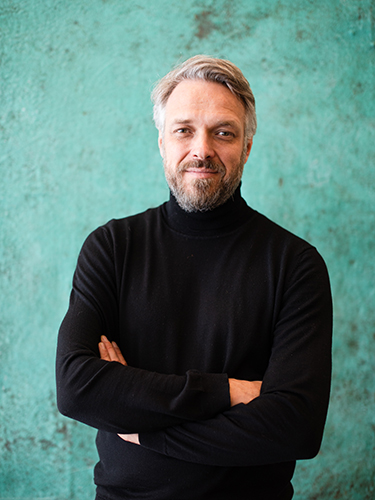Brain researcher with a jazz flute.
Text: Christoph Dieffenbacher
Philipp Sterzer investigates how our brain works – both in terms of everyday perception and in cases of severe psychosis. But music is his true love.
There are times in life when several things change all at once. The best thing you can do at such times is focus on what really matters and relegate everything else to the side. When Philipp Sterzer moved from the Charité hospital in Berlin to Basel in spring 2022, having a fully furnished office at the University Psychiatric Clinics (UPK) was probably not his main concern.
He had other priorities. Some reorganization of the clinic for adults was needed in order to align research more closely with patient care.
Crammed with boxes, pieces of furniture and half-filled shelves, the little office facing out onto the hospital’s park-like grounds still has a rather improvised look about it. There are no personal items on display and no pictures hanging on the walls. Sterzer remarks apologetically that this is just a temporary setup. To create a bit of distance, he has taken a seat at the conference table. He is tall and athletic, with a wide, open face. His graying hair and beard differ slightly in shade.
In a quiet but enthusiastic tone, the 53-year-old professor of psychiatry and lead consultant tells me about his research. Along with teaching and clinical practice, this constitutes a large part of his work. “I find it fascinating to work with empirical data from which I can derive concrete conclusions.” He also likes exchanging and discussing ideas with academic colleagues in Basel or abroad. He is currently preparing for a lecture and hospital visit in Germany. He’s not involved much with patient care at the moment, although that is something he’d like to change. Currently his help is required mostly in difficult cases – for instance, when someone is expressing suicidal thoughts and decisions need to be taken about their treatment.
What the brain figures out for itself
Sterzer wants to understand how our brain works. The organ is exposed to change on an almost constant basis. In fractions of a second, it has to process and react to the sensory data that it receives. How it manages to do that is something that captured his interest during his early years as a basic researcher in Munich and Berlin. How does conscious perception work? In what way do we select particular stimuli? And how does our brain construct the world as we see it?
He provides an example to illustrate this. “I’m riding my bike down a street and see a movement out of the corner of my left eye. At first, I don’t know what it is. Is it a truck coming round the corner or a poster flapping against a wall?” You have to make a split-second decision: should I brake immediately or keep going? “We live our whole lives in this kind of world of perceptual uncertainty,” Sterzer explains, “and our brain has to make sense of things over and over again in response to changing stimuli.”
Of course, mistakes and glitches can also happen along the way. This is shown by visual illusions, for example. Sterzer says, “We think we are more rational than we really are.” That’s why we shouldn’t place too much trust in the picture we have of the world. For a while he has been grappling with some additional questions. What if perception is altered pathologically – if people lose contact with reality because of delirium or hallucinations? “The reality of people with psychiatric illness can look totally different from our own,” Sterzer observes. And yet, the boundaries between what we consider normality and illness are fluid.
Tracing the causes of psychosis
Sterzer carried out an experiment, for example, to find out when we perceive coherent movement in a cloud of moving dots. His scientific work, which also makes use of imaging techniques such as MRI and electroencephalography, has gained much recognition. Undine Lang, the director of the UPK, describes him as “a top-class researcher who is really taking psychiatry forward as a science.”
His former colleague Andreas Kleinschmidt, Head of the Division of Neurology at Geneva University Hospital, adds that Sterzer has identified neuronal mechanisms whose disruption may be the cause of psychosis.
Sterzer is able to provide a clear explanation of what is going on in our heads not just to specialists but also to a wider public. His book Die Illusion der Vernunft (The illusion of reason), published in 2022, in which he describes how our brain can lead us astray and shape our most strongly held beliefs, was a success. In his 2013 book 29 Fenster zum Gehirn (29 windows on the brain), which he co-wrote with a colleague, he provided younger readers with a short and pithy account of experiments and theories relating to perception, movement, language, love and memory.
Although writing is hard work, he says, it’s something he really enjoys. Through his books, which include forays into philosophy, evolutionary biology and sociology, Sterzer hopes to make his research accessible, but also to help reduce the stigma attached to psychiatric illnesses in society.
Playing music on a sailing ship
For Sterzer, a career as a scientist and psychiatrist was not preordained. When he was starting his medical degree, he almost opted for music. While still at school, he was a keen flute player in a band called, tellingly, Mind Games. “But at the time I thought I wasn’t talented enough for a career as a musician.” He has no regrets about his chosen path, however.
He still performs on a regular basis with the same two friends from his old band. He has already played at a children’s circus, then with a quartet on a sailing ship in the Mediterranean and, in April, will perform at a jazz festival in Friuli.
Since his move to Basel, however, his flute playing has had to take a bit of a backseat. He also has no time for another book right now. He will, hopefully, be able to manage the odd trip on the weekends to the mountains, which remind him of his childhood in Upper Bavaria. Part of his family has followed him to his new home. While his two grown-up children are staying in Berlin, his wife and his youngest son, a late arrival, are with him in Basel. All three of them feel at home in the city. For now, Sterzer can say that the time when several things change all at once is probably behind him.
Philipp Sterzer has been Professor of Translational Psychiatry and principal consultant at the University Psychiatric Clinics in Basel since May 2022. Born in 1970, he grew up in Rosenheim (Bavaria) and studied medicine at the University of Munich and Harvard Medical School in Boston. After completing his doctorate and habilitation thesis in experimental psychiatry at the Humboldt University of Berlin, he carried out research at the Charité, including work on neuroimaging and computational modeling of psychoses.
More articles in this issue of UNI NOVA (May 2023).


